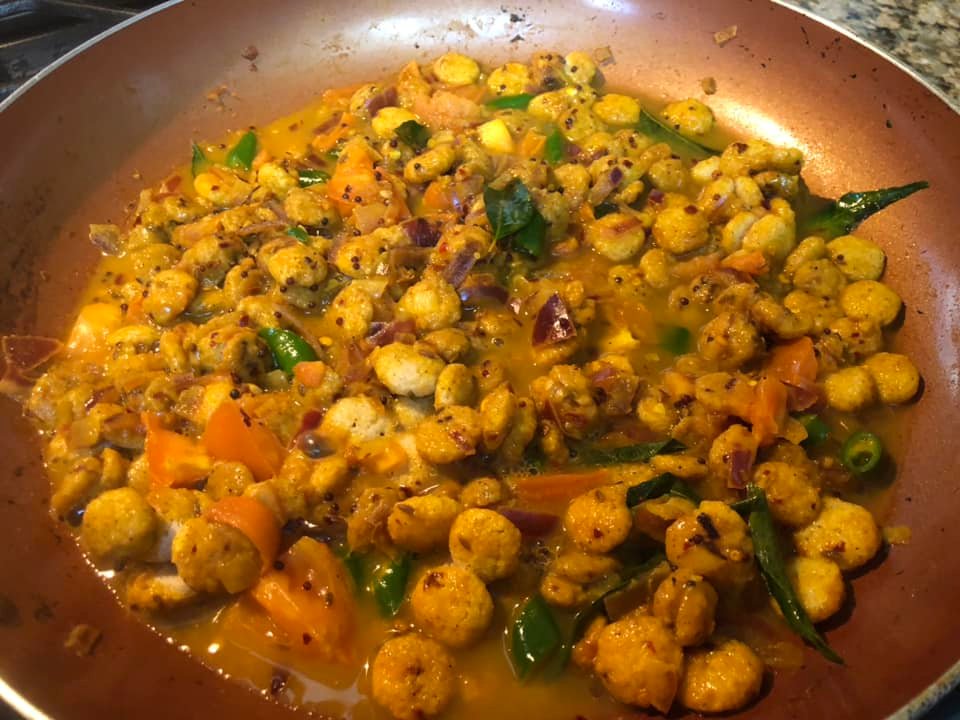Huma's Jowar Bati breakfast
As much as Jowar (Sorghum) is great for health we often find it difficult to make the jowar bati (roti popular in Rajasthan-India) or eat it another way !! I found these Jowar murmuras the other day in the Indian grocery store and had been thinking to innovate a quick and easy variation that could be incorporated in weekly breakfast or meals. Made this super easy and quick breakfast and it’s so yummy and fulfilling .. Low glycemic index, high fiber, low carbohydrate!! A must have for a diet regime, cardiovascular health, weight loss, diabetes and numerous other nutritional benefits !! And most importantly it’s pure and organic ✨👩🍳
| - Jowar murmuras |
| - Onion - 1 |
| - Tomato - 1 (optional) |
| - Fresh Curry leaves - 8 |
| - Green chillies - 2 |
| - Red chilly flakes - 1tsp |
| - Zeera - 1 tsp |
| - Haldi - 1 tsp |
| - Salt to taste |
| - Mustard seeds - 1tsp |
| - Mustard oil or vegetable oil - 3 tbs |
| - Cilantro (hara dhaniya) - optional |
| - Lemon- 1 |
Instructions:- |
| 1. In a shallow pan warm up the oil and sauté zeera, onion, mustard seeds, curry leaves for 1 min until they start to chitter !! |
| 2. Now add the murmuras and roll fry for 1min |
| 3. Add the rest of the masalas (salt, haldi, red chilly flakes) and roll so as to cover all murmuras. Sprinkle a little water if you think it’s too dry. Cover and cook on low heat for 5 min. Garnish with more curry leaves or hara dhaniya and lemon. Serve with dahi or just enjoy as is !! |
| *Cultural significance of Jowar:* |
| - Sorghum, also known as sorghum bicolor, is a grain crop that has significant cultural background and significance in many regions around the world. It is an ancient cereal grain that has been cultivated for thousands of years and is widely consumed in various forms. |
| - Sorghum is versatile and can be used to make various food products such as porridge, flatbreads, couscous, and traditional alcoholic beverages like beer and spirits. |
| - Beyond its role as a food source, sorghum has significant cultural and ceremonial value. In some African cultures, sorghum is used in rituals, festivals, and symbolic offerings. It is often associated with fertility, prosperity, and spirituality, representing a connection to the land and ancestral traditions. |
| - Sorghum's cultural significance extends beyond Africa. In Asia, particularly in countries like India and China, sorghum has been cultivated for centuries and holds cultural importance as a dietary staple and for its use in traditional medicine. In the United States, sorghum is commonly used as animal feed and in the production of biofuels. |
| - Overall, sorghum's cultural background and significance lie in its role as a vital food crop, its versatility in culinary traditions, and its association with cultural practices and rituals in various parts of the world. |

Welcome to our food blog!

Hi! I'm Huma. Here you'll find delicious, trusted recipes with easy step-by-step photos and videos.
Learn More


.png)
.png)
.png)